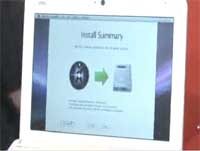 Today, Google is partnering with the New America Foundation (a non profit that is chaired by Google CEO Eric Schmidt) and a group of academics to develop an open platform for creating Internet connection measurement tools.
Today, Google is partnering with the New America Foundation (a non profit that is chaired by Google CEO Eric Schmidt) and a group of academics to develop an open platform for creating Internet connection measurement tools.
Google says the platform, called Measurement Lab (M-Lab), will help researchers create tools that help determine the root cause of sluggish Internet application performance. Over the course of the yea, Google will deploy 36 servers in 12 locations in the U.S. and Europe as a distributed backing infrastructure. A limited number of users will be supported initially.
Data aggregated by M-Lab will be freely available researchers, according to a blog post co-written by Vint Cerf, Google’s chief Internet evangelist, and Stephen Stuart, the project’s principal engineer. Google wishes for M-Lab to be a community-based effort, and invites anyone that wants to donate servers, tools, and other resources to participated, they noted.
“At Google, we care deeply about sustaining the Internet as an open platform for consumer choice and innovation. No matter your views on net neutrality and ISP network management practices, everyone can agree that Internet users deserve to be well-informed about what they’re getting when they sign up for broadband, and good data is the bedrock of sound policy. Transparency has always been crucial to the success of the Internet, and, by advancing network research in this area, M-Lab aims to help sustain a healthy, innovative Internet,” they wrote.
With companies such as Comcast (which prompted an FCC investigation) and Cox Communications prioritizing network traffic, this is good news for consumers and consumer advocacy groups. M-Labs could be a valuable research to help detect bandwidth throttling and let people confirm that they are truly getting what they are paying for.

 Shortly after the first-generation iPod Nano launched, it became apparent that they
Shortly after the first-generation iPod Nano launched, it became apparent that they Microsoft will distribute Windows Mobile 6.5 to its partners after it launches the OS at the Mobile World Congress in February, according to a
Microsoft will distribute Windows Mobile 6.5 to its partners after it launches the OS at the Mobile World Congress in February, according to a  It might not be
It might not be  Deflation is rearing its head in the chip-making business. Advanced Micro Devices intends to
Deflation is rearing its head in the chip-making business. Advanced Micro Devices intends to  Apple has a history of hypersensitivity toward the media. It once
Apple has a history of hypersensitivity toward the media. It once